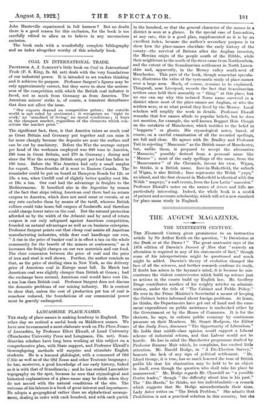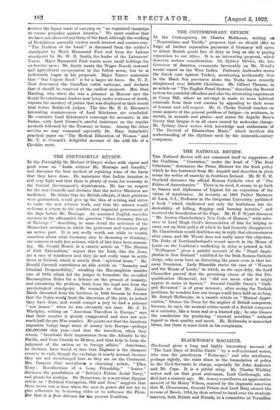THE AUGUST MAGAZINES.
THE NINETEENTH CENTURY.
THE Nineteenth Century gives prominence to an instructive article by Sir Arthur Keith on the question, "Is Darwinism at the Dusk or at the Dawn ? " The great anatomist says of the 1874 edition of Darwin's Descent of Man that "scarcely an alteration is required in any of his statements of fact," though some of his interpretations might be questioned and much might be added. Darwin's theory of evolution changed the face of all the sciences, and further research confirms its truth. If doubt has arisen in the layman's mind, it is because he mis- construes the violent controversies which build up science just as actions in the courts build up English law. Mr. Geoffrey Drage contributes another of his weighty articles on adminis- tration, under the title of "The Cabinet and Public Policy." He sees in the Prime Minister's Secretariat a means of keeping the Cabinet better informed about foreign problems. At home, he thinks, the Departments have got out of hand and the enor- mous expenditure on public assistance is unchecked either by the Government or by the House of Commons. It is for the electors, he says, to enforce public economy by continuous pressure on their Members. Mr. Stuart Hodgson, the Editor of the Daily News, discusses "The Opportunity of Liberalism." He holds that middle-class opinion would support a Liberal scheme of industrial reform, and that Labour would not be hostile. He has in mind the Manchester programme drafted by Professor Ramsay Muir which, he complains, has excited little attention. Mr. Harold Hodge, in "A Pm-Election Survey," laments the lack of any sign of political settlement. "Mr. Lloyd George, it is true, has so much lowered the tone of British publie life that his elimination may be held to be an object in itself, even though the question who shall take his place be unanswered." Mr. Hodge regards Mr. Churchill as "a possible Centre leader," though "the difficulty about him is his past." The " Die-Hards," he thinks, are too individualistic—a remark which suggests that Mr. Hodge misunderstands their aims. Lady Astor writes on "The Drink Problem." She admits that Prohibition is not a practical solution in this country, but she
accuses the liquor trade of carrying on "an organized campaign to create prejudice against America." We must confess that we have not observed anything of the kind, although the working of Prohibition naturally excites much interest and controversy. "The Problem of the Land" is discussed from the soldier's standpoint by Major Hammond Foot and from the Labour standpoint by Mr. W. R. Smith, the leader of the Labourers' Union. Major Hammond Foot wants more small holdings for ex-Service men ; Mr. Smith wants the Wages Boards restored and agricultural co-operation in the fullest sense, but he is judiciously vague in his proposals. Major Turner maintains that "Our Urgent Need" is for a larger air force. Mr. W. P. Neal denounces the Canaan cattle embargo, and declares that it should be removed at the earliest moment. Mrs. Stan Harding, who when she was a prisoner in Moscow met the Social Revolutionary leaders now lying under sentence of death, exposes the mockery of justice that was displayed at their recent trial before Bolshevik judges. The late Mr. E. G. Harman's Interesting reminiscences of Lord Kitchener are concluded. He contrasts Lord Kitchener's contempt for accounts, in the Sudan, with Lord Cromer's careful insistence on the regular methods followed by the Treasury at home. Among the other articles we may commend especially Dr. Mary Scharlieb's practical paper on "The Medical Education of Women" and Mr. T. A. Coward's delightful account of the wild life of a Cheshire mere.



































 Previous page
Previous page